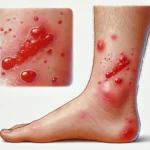Description:
Doxycycline is a broad-spectrum antibiotic that belongs to the tetracycline class of antibiotics. It is commonly used to treat a wide range of bacterial infections, including respiratory tract infections, skin infections, sexually transmitted infections (such as chlamydia), and certain types of acne. It is also used in the prevention and treatment of malaria and some tick-borne infections like Lyme disease and Rocky Mountain spotted fever.
Key Points:
How It Works: Doxycycline works by inhibiting the production of proteins that bacteria need to grow and multiply. By preventing protein synthesis, it effectively stops the growth of bacteria, helping the body’s immune system to eliminate the infection.
Common Uses: Doxycycline is used to treat various conditions, including:
Respiratory tract infections (e.g., pneumonia, bronchitis)
Skin infections, including acne and rosacea
Urinary tract infections
Sexually transmitted infections (e.g., chlamydia, gonorrhea)
Lyme disease and other tick-borne illnesses
Prevention of malaria (when traveling to areas where malaria is common)
Treatment For:
AI generated Summary: Based on the single review provided, Doxycyline appears to be an effective treatment for cellulitis, particularly in cases caused by MRSA (Methicillin-resistant Staphylococcus aureus). The reviewer, identified as Dr. Curbside, rated the treatment as 5 out of 5, suggesting a high level of effectiveness. However, more reviews would be needed to draw a more comprehensive conclusion about the overall efficacy of Doxycyline in treating cellulitis.





